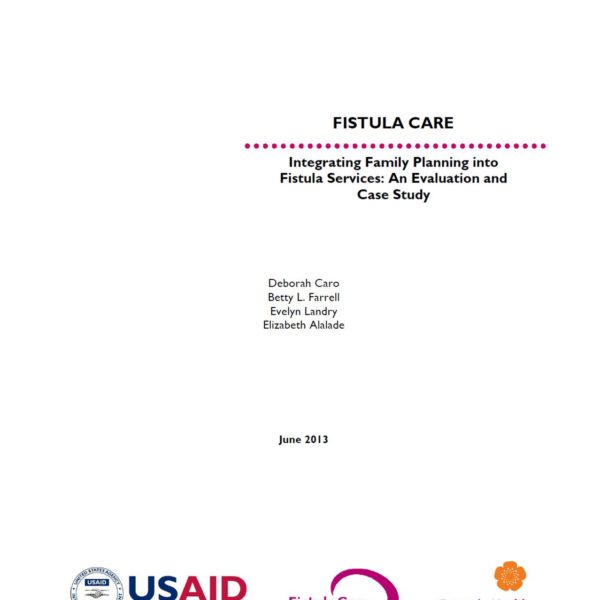The prevention component of Fistula Care (FC) includes family planning (FP), to help women and couples affected by fistula delay early childbearing, prevent unintended pregnancy, ensure healthy timing and spacing of pregnancy following fistula repair, and limit pregnancy where family size has been achieved. FP not only offers women and couples adequate time for complete healing; it also helps couples achieve a desired pregnancy. For a long time, providers have assumed that women have no need for or little interest in FP following surgical repair of fistula, since these women have often lost their babies as a result of obstructed and prolonged labor and may have no living children. However, recent studies by colleagues working in this field show that there is no evidence to support this assumption. FC’s experience with integrating FP into fistula repair services in a variety of country settings responds to women’s needs.
FC’s core program design includes FP in the counseling training of staff at all sites that the project supports. FC adapted EngenderHealth’s FP-HIV Integration Approach to the context of fistula services and introduced the FP integration approach in six countries: Democratic Republic of the Congo (DRC), Guinea, Mali, Nigeria, Rwanda, and Uganda. The FP integration approach:
- Identifies the level of FP service that may be successfully sustained, depending on the capacity of the fistula repair site.
- Facilitates the modification of service delivery systems (e.g., training, record keeping, supervision, referral, and commodity logistics), through the implementation of a five-step process. Job aids and client materials are adapted to support the integrated services
This study was designed to: analyze trends shown in routine monitoring data collected on Family Planning (FP) counseling and FP acceptors; review experiences with and impressions of the integration process obtained from key informants and clients; analyze relevant and related results from two studies conducted by Fistula Care (FC); and conduct observations of patient-provider counseling sessions, focus group discussions, and self-assessments followed by group discussions to collect additional in-depth data on the integration process and results. The Nigeria integration experience—having been implemented for the longest period?is featured as a case study to illustrate the interventions and their results. FP integration activities in all other FC-supported countries are summarized to highlight the interventions undertaken, their experience with the integration approach (when it was introduced), the results achieved, and challenges encountered.

